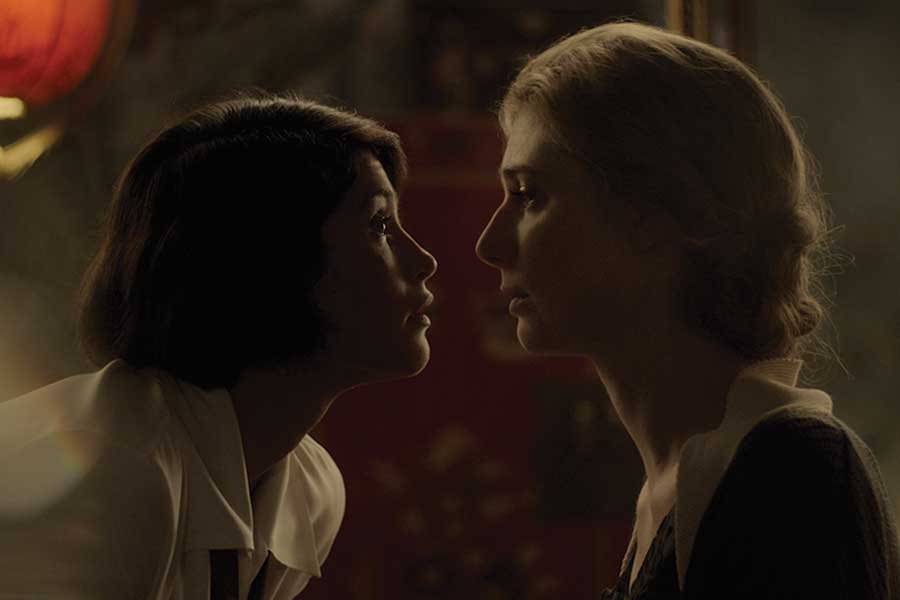The handsome romantic drama “Vita & Virginia” artfully, if emptily, depicts the true-life relationship between writers Vita Sackville-West (Gemma Arterton) and Virginia Woolf (Elizabeth Debicki).
Director Chanya Button co-wrote the screenplay opening September 6 at the Landmark Ritz at the Bourse with actress Eileen Atkins (who wrote the original play) using the authors’ letters. The film is not starchy like a “Masterpiece Theater” or one of the stuffier Merchant-Ivory productions. Although set in the 1920s, and featuring period costumes and cars, it aims to be quite modern. The musical score is decidedly contemporary. And the attitudes about love, sex and marriage, are deliberately ahead of the post-Edwardian era mores. Case and point: Vita and her husband Harold (Rupert Penry-Jones) are first seen talking on a radio program about their marriage and her masculine qualities. It is positively scandalous, and very much in keeping with how the couple’s same-sex affairs were indulgences that usually drew them closer. Until Vita met Virginia.
When Vita first spies Virginia dancing at a party, the moment is rendered in slow motion. Vita is driven by her attraction as much as she desires to be accepted by the bohemian members of the Bloomsbury Group, which includes Woolf’s sister, Vanessa Bell (Emerald Fennell), and the gay painter Duncan Grant (Adam Gillen). Virginia muses about bodies, and observations about relationships are made. It is all very properly improper, and some viewers may get caught up in the naughtiness.
Yet Harold is wary as Vita is becoming obsessed with Virginia. He warns her to be discreet and feels overwhelmed by her sapphic phase. Vita promises she won’t be tempted, but, of course, the opposite is true.
“Vita & Virginia” spends much of its first-half establishing the boundaries of the characters so it can break them. Virginia is inscrutable and vulnerable, which is why Vita wants her admiration. Vita is bewitched by Virginia’s writing, which is thoughtful; her work is more successful. Vita eventually offers a book to Virginia’s husband Leonard (Peter Ferdinando), a publisher, as a means of getting closer to her obsession. Meanwhile, Virginia, who is grappling with her same-sex desires, and has bouts of madness, eventually finds a muse in Vita.
Button features many scenes that discuss the husbands’ jealousies, arrangements in marriages, as well as Virginia telling Vita, “You have as much of me as I have to give,” but these impassioned moments lack emotion at times. By the time Vita and Virginia settle down by a fire, in Knole, a country house, to kiss and caress, it is hard to muster up much enthusiasm for them being together.
In addition, as the women exchange letters — they separate when Vita heads abroad; Harold is a diplomat and he insists she perform her “wifely duties” — Woolf writes about “a dark pool of sticky water closing over me,” (This text comes from the author’s first novel, “The Voyage Out,” published in 1915). It feels too on-the-nose, especially given Woolf’s famous death by drowning — alluded to late in the film when Virginia stands by the edge of the Thames.
The film has many scenes that feel overstated. A couple of magical realist scenes where Virginia envisions ivy creeping indoors or an attack of birds (signifying her madness) are overdone and unnecessary.
In one of the film’s more dramatic moments, Duncan effusively advises Virginia to let the “eye lick it up,” and the brain should be “watching things happen without troubling to think.” This may be a good approach when viewing “Vita & Virginia,” as it provides some gorgeous people in pretty clothing and decorously well-appointed rooms doing things that do not require much concentration or consideration. All of the talk between Vita and Virginia about power and attraction does not amount to anything profound. The film observes rather than feels.
When Virginia experiences an episode of madness, Vita is lured back from abroad to take care of her. It is around this time that Virginia develops her idea for her book, “Orlando” with Vita as the fictional gender-bending biography’s image and muse. This may be the point of “Vita & Virginia” — how this “collaboration” lead to Woolf’s greatest literary success. But Button fails to capture the essence of it in the same way Virginia captures the essence of Vita.
The performers do their best with the lackluster material. Gemma Arterton certainly looks enticing in all of Vita’s splendid outfits, and she strives at playing larger than life. But a little restraint or nuance might have helped. Her character is so transparent in her emotions and desires, she rarely fascinates. Elizabeth Debicki is stronger, and suitably mannered as Woolf. The actress makes the most of her character’s internal moments.
Alas, “Vita & Virginia” is ambitious but imperfect. It takes an interesting tale of queer literary history and teases out the spirit of the women’s relationship, but not its heart.
